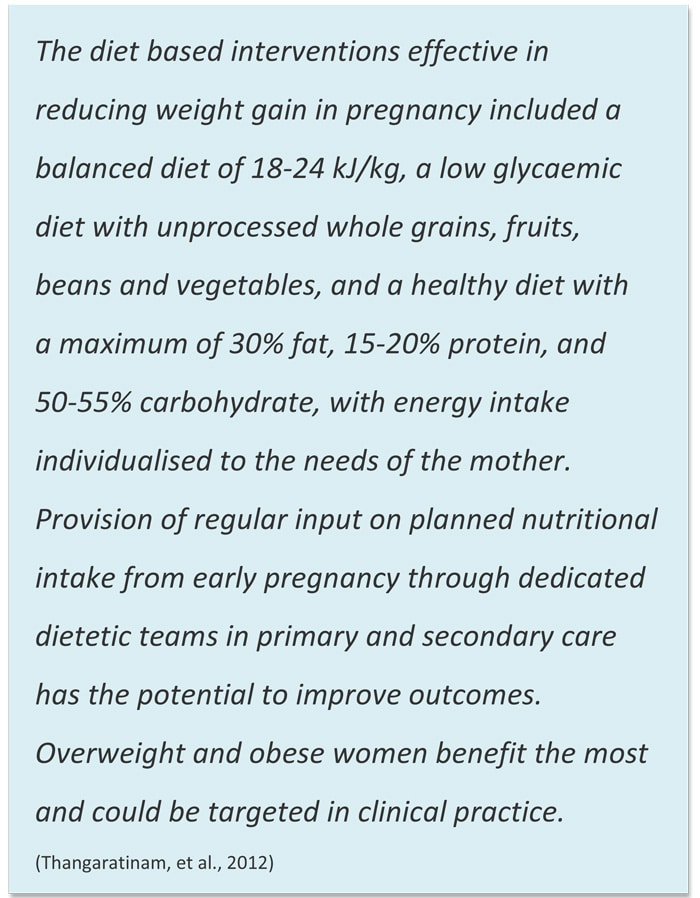Integrative Health|Nutrition
A Guide to Optimal Wellness in the Childbearing Year – Nutrition for the Childbearing Year: Caloric Targets

Calories: How many?
How many more calories should you consume daily during pregnancy? Growing your baby takes some added energy, but exactly how much energy will vary from woman to woman. As a general guideline, an average of 340 additional calories each day is needed to accommodate your pregnancy. Your energy needs will increase as your pregnancy progresses. A guideline that is often cited is that you can expect to increase your intake of calories to 300 calories a day by the second trimester and to 400 calories a day by the final trimester. The actual calorie intake range for the average pregnant woman ends up being 2200-2900 calories a day, according to the Academy of Nutrition and Dietetics.
Weight gain during pregnancy
If you are within a normal weight range before you become pregnant, the average expected weight gain is between 25-35 lbs for a single pregnancy. If you are below normal weight, you might shoot for a 40 lb weight gain, and if you are overweight or obese you will still be expected to gain 15 lbs in most cases.
If you are beginning your pregnancy either under or overweight, your health care provider can support you in finding the right balance when it comes to your individual calorie intake range and where those calories should come from to support optimal wellness for you and your baby.
Getting enough…
It’s been a longstanding practice for providers to caution against calorie restriction or carbohydrate restriction during pregnancy without careful oversight. Ketones are the byproduct of stored or ingested fat cells burned to meet your energy needs when your dietary intake falls short. The idea that an overabundance of ketones in itself is a single cause of potential fetal injury has been dispelled, but there is longstanding evidence from research conducted during famines (Thangaratinam, et al., 2012) that extreme caloric restriction or very high or very low glycemic diets pose an increased risk to your infant for:
• neural tube defects,
• cleft lip and palate,
• coronary artery disease,
• metabolic syndrome and other complications.
Calories aside, a restricted calorie diet might simply be lacking in nourishment. If you are eating fewer calories, it can be challenging to get in all the nutrients your body will need during your pregnancy. For women experiencing severe nausea or hyperemesis gravidarum, your health care team can support you in taking in what nutrients you can. Functional medicine approaches can help you find the right foods and enzymes to ease your discomfort and keep you nourished.
…but not overdoing
Is pregnancy a time to make lifestyle changes for weight management or other health goals? It can be! Your childbearing year is an opportunity to develop healthy habits that will serve you well in many ways during and beyond your pregnancy. Placing attention on eating a balanced diet with nutrient dense foods, fruits and vegetables, whole grains, healthy fats and lean protein are all good things! If you are obese or at risk for gestational diabetes, moderating your diet during pregnancy could bring benefits lasting far beyond your childbearing year.
In conducting a meta-analysis of numerous studies involving the impact of calorie restriction and exercise interventions for overweight or obese women during pregnancy, Thangaratinam, et. al show that these changes can result in a significant reduction in pre-eclampsia, gestational diabetes, gestational hypertension and pre-term birth. It was also shown that diet and exercise changes reduce rates of birth injury. This may point to a potential preventative approach for women who are at risk during pregnancy.
Often, women wait until the 24th-28th week of their pregnancy to test for gestational diabetes, and only then does the discussion about diet and exercise begin. Whether it’s moderating calories or increasing them, creating a nutrition strategy at the beginning of your pregnancy to prevent complications, keep your blood glucose levels from spiking and crashing and ensure that you are getting the right proteins, healthy fats and micronutrients just makes sense!
 How do we interpret the impact of any one particular nutritional or exercise strategy? As an Integrative Health Coach, I see that lifestyle changes are woven together. When we pay attention to our diet we are re-patterning our habits. It’s not only what we don’t eat, but what we do eat. Eating less high sugar foods for instance often involves replacing them with more nutrient dense foods like fruits and vegetables. Stress management and other benefits come along for the ride when we implement exercise and activity. And when we feel more energized and de-stressed we exercise or meditate, we make more mindful choices about nutrition and find it easier to resist cravings for junk foods. Anytime I see studies demonstrating benefits of a particular ‘diet’, I consider all of these other co-existing patterns that are harder to isolate.
How do we interpret the impact of any one particular nutritional or exercise strategy? As an Integrative Health Coach, I see that lifestyle changes are woven together. When we pay attention to our diet we are re-patterning our habits. It’s not only what we don’t eat, but what we do eat. Eating less high sugar foods for instance often involves replacing them with more nutrient dense foods like fruits and vegetables. Stress management and other benefits come along for the ride when we implement exercise and activity. And when we feel more energized and de-stressed we exercise or meditate, we make more mindful choices about nutrition and find it easier to resist cravings for junk foods. Anytime I see studies demonstrating benefits of a particular ‘diet’, I consider all of these other co-existing patterns that are harder to isolate.
Be kind to yourself as your body changes
So, we’ve discussed adding calories and the possibility of containing them a bit. I believe it is also important that you be open to and allow for the body changes that will occur during your pregnancy—try to experience them with ease and acceptance.
Barring obesity and its complications, pregnancy is a time to include healthy fats in our diets and allow some fat to store itself on our hips—your baby needs some of that stored fat! In fact, very low body fat can affect the composition of your breastmilk.
I have clients who have felt very shamed by what is objectively a healthy weight gain for them during their pregnancy. Some suffer from self-imposed stress regarding what is normal pregnancy growth. When these issues are getting in the way, we back up and explore the foundation of what wellness means in terms of diets that are diverse, healthy and balanced and activity that enhances health.
Self-care and mindful-awareness are key
In the next several posts we’ll discuss balancing protein, fat and carbohydrates in your diet for pregnancy and explore the key vitamins and minerals that your body needs for this project of making your baby and keeping your own body and mind thriving!

























